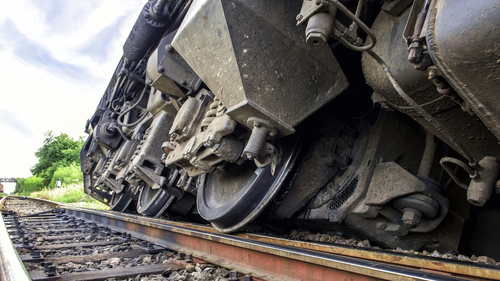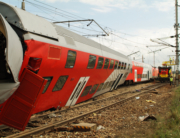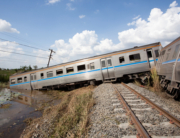Many of the laws that pertain to the train industry are federal regulations, not Florida state law. Some Florida statutes can come into play, however, when there is an accident that involves a train.
Your Florida Personal Injury Protection Insurance (PIP) and Train Accidents
Your Florida Personal Injury Protection Insurance (PIP) might cover some of your losses if you are in a car when the train accident happens. All motor vehicle drivers in Florida must carry PIP insurance.
How PIP coverage works: You must receive your initial medical services, whether that is from a doctor, emergency room, urgent care center, or some other medical facility within 14 days of the train wreck. PIP will not pay your medical bills if you miss this deadline. PIP will pay up to 80 percent of your reasonable and medically necessary medical, surgical, and rehabilitative services.
PIP can also reimburse you for a portion of your lost wages. The program also provides a small amount of compensation for disability arising from the crash. PIP benefits are not unlimited. There is a cap of $10,000 for your medical expenses, lost wages, and disability combined. If a covered person died from his injuries, PIP can pay up to $5,000 in death benefits.
Florida’s “Permanent Injury Threshold” Rule
If your injuries fall under PIP coverage, you can only receive those benefits unless your situation meets the requirements of the “Permanent Injury Threshold.” Once you satisfy these tests, you get to file a lawsuit against the person whose negligence caused your injuries. It only takes one of these situations to meet the standards of the Permanent Injury Threshold in Florida:
- An injury that you can prove, within a reasonable degree of certainty, will be permanent.
- Permanent and significant scarring and disfigurement.
- Permanent and significant loss of an important bodily function.
When you meet the requirements of the Permanent Injury Threshold, you must then prove that the party you are suing is responsible for your losses.
The Four Prongs of Liability in Florida Train Wrecks
If you do not have to use PIP coverage, or if you satisfy the Permanent Injury Threshold for circumventing PIP, you will have to show all four of these elements to hold the negligent party responsible for your damages:
Duty of care: The person who caused your injuries must have owed you a duty of care. Let’s say that you were a passenger on a train. The train engineer (driver) owes you a duty of care to operate the train cautiously and follow the applicable rules, like speed limits.
Breach of the duty of care: When the train driver breaches the duty of care, she is negligent. For example, the train got off to a late start, and the engineer tried to make up for lost time by exceeding the speed limit.
Causation: The negligence must have caused the accident that harmed you. The train derailed because the driver took a sharp curve at too high a speed, and the train could not stay on the tracks. The engineer’s negligence of speeding caused your injuries.
Actual harm: The fourth element is actual harm from the accident. If you were lucky enough to escape the train derailment without physical injuries, the engineer is not liable to you, even though you most likely experienced quite a fright. On the other hand, if you suffered physical harm, the driver is responsible for your losses. In these situations, the train company or government agency usually will be liable as well.
Types of Damages in Train Accidents
Your claim can include both economic damages and non-economic losses. Some examples of damages in train accidents include:
- Personal property. The costs to repair or replace personal property damaged in the accident.
- Lost wages, to replace the wages, salary, self-employment, or other income you lost because of the accident and recuperation.
- Diminished earning potential, if your injuries render you unable to make as much money as before.
- Disability, if your injuries leave you unable to support yourself through gainful employment.
- Medical bills. You can claim all reasonable costs of medical treatment that you needed because of the wreck. Examples include an ambulance, emergency room, hospital, surgery, doctors, prescription drugs, and physical therapy.
- Future medical care, if you will need follow-up or ongoing medical services.
- Long-term care, if you will need daily medical care or personal assistance because of the accident.
- Non-economic damages, like pain and suffering, loss of consortium, loss of enjoyment of life, and disfigurement.
Federal Train Regulations
The train industry must comply with many federal regulations to stay in business. These rules include such things as:
- Qualification and certification standards for engineers
- Compliance with hours of service requirements
- Track and signal maintenance and inspection
Violating these regulations can be negligence.
Types of Train Accidents
Many different things can cause a train injury. Some of the more common train accident scenarios involve:
- Striking pedestrians on the train rails and bridges – failure to take reasonable steps to ensure the safety of pedestrians
- Derailment
- Excessive speed
- Insufficient training or experience of the engineer (train driver)
- Inadequate warnings at railroad crossings
- Lack of warning lights or safety gates at train crossings
- Defective/broken warning lights or safety gates at crossings
- Driver error due to distraction, fatigue, or intoxication
- Inadequate track/rail maintenance
- Mechanical malfunctions
- Other motor vehicles on the tracks (stalled or abandoned)
- Entering and exiting the train at train stations
- Slip and fall or trip and fall inside a train or in a train station because of slippery or poorly cleaned floors, or garbage or debris on the ground.
Who Owns or Operated Trains in Florida
In Florida, there is one privately-owned train company, Brightline. There are many government-owned train lines:
- Amtrak, the national railroad passenger corporation
- Tri-Rail in Miami, Fort Lauderdale, West Palm Beach and operated by the South Florida Regional Transportation Authority
- Metrorail in Miami, managed by Miami-Dade Transit
- SunRail
- Florida East Coast Railway
Investigating a Train Accident in Florida
We investigate every train accident case we handle with Florida train accident laws in mind. Our investigation can include:
- Photographs of the scene of the accident
- Statements from witnesses and passenger
- Railroad accident reports from the NTSB National Transportation Safety Board
- Safety inspection records
- Equipment maintenance records
- Documents from the Federal Railroad Administration
Getting Legal Help After a Florida Train Accident
These cases can be complicated because they usually involve suing a government agency or large corporation. At Montero Law Center, a train accident injury lawyer will talk with you about your accident and discuss Florida train accident laws at no charge to you. We can help you with what to do after a train accident. There is no obligation. We do not get paid until you win.
Rooted in the old-fashioned values of faith, family, and hard work, Montero Law Center will work hard to get you all the compensation that you deserve so that you can focus on getting better. Call us today at 954-767-6500 to set up your free consultation.
 English
English  Español
Español 



